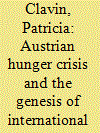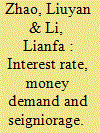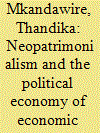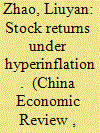|
|
|
Sort Order |
|
|
|
Items / Page
|
|
|
|
|
|
|
| Srl | Item |
| 1 |
ID:
131424


|
|
|
|
|
| Publication |
2014.
|
| Summary/Abstract |
From its foundation in 1918, the new Austrian republic was gripped by famine and a crisis of confidence in its currency that threatened to tip the new state into hyperinflation and revolution. This article shows how western efforts to aid Austria combat famine and its financial crisis were linked, and how they had a profound impact on the new League of Nations, the world's first multi-purpose intergovernmental organization. It also demonstrates the importance of the incipient wartime international bureaucracy for League agency. Contrary to the expectations of its architects, member governments, international financiers, businessmen and economists began to see the League as a useful tool to meet common needs that today would be called the search for human security. The article demonstrates how the Austrian food and financial crisis was the founding moment in the institutionalization of international economic and financial coordination, cooperation and oversight. It established the Economic and Financial Organization of the League of Nations, whose work would later inform its successors, the International Monetary Fund, the World Bank and the European Union. The study speaks to the ways in which the notion of security has broadened in the past two decades to embrace economic, social, political and environmental concerns. But the notion of 'human security' is not new; it was written into the body of the League.
|
|
|
|
|
|
|
|
|
|
|
|
|
|
|
|
| 2 |
ID:
143417


|
|
|
|
|
| Summary/Abstract |
The lack of an observable variable measuring inflationary expectation has been a major difficulty in empirical work on hyperinflation. In this paper we propose a direct measure of expectations—the black-market interest rate in Shanghai—and study the behavior of money demand in the Chinese hyperinflation. Although the log–log schedule may provide an accurate description of money demand with relatively low interest rate, the pattern of seigniorage collected in the highest hyperinflation is consistent with the prediction of the semi-log schedule. The comparison of the seigniorage actually collected with the maximum steady state level shows that the economy might be on the increasing side of the Laffer curve except for the concluding stage of the hyperinflation. This suggests that the Chinese hyperinflation has been driven mainly by the government's quest for revenue.
|
|
|
|
|
|
|
|
|
|
|
|
|
|
|
|
| 3 |
ID:
139924


|
|
|
|
|
| Summary/Abstract |
During the past two decades, neopatrimonialism has become the convenient, all purpose, and ubiquitous moniker for African governance. The school of thought behind this research program, which the author refers to as the neopatrimonialism school, has produced an impressive literature on Africa. Its analysis informs policymakers and its language permeates media reportage on African states. While neopatrimonialism has long been a focus of development studies, in recent times it has assumed politically and economically exigent status. The school identifies causal links between neopatrimonialism and economic performance, and makes predictions drawing from what is referred to as the "logic of neopatrimonialism." Neopatrimonialism is said to account for trade policies, hyperinflation, economic stagnation, low investment in infrastructure, urban bias, andultimately, the lack of economic development in Africa. This article examines the empirical basis of predictions and policy prescriptions. It argues that while descriptive of the social practices of the states and individuals that occupy different positions within African societies, the concept of neopatrimonialism has little analytical content and no predictive value with respect to economic policy and performance.
|
|
|
|
|
|
|
|
|
|
|
|
|
|
|
|
| 4 |
ID:
156464


|
|
|
|
|
| Summary/Abstract |
This paper presents new evidence for the Fisher hypothesis, which states a positive relationship between nominal stock returns and inflation. We introduce a new data set from the episode of hyperinflation that occurred in China after World War II. To establish the reliability of our estimates we consider different frequencies, and time horizons and econometric models. The results reveal that stocks were a complete hedge against expected inflation and a partial hedge against unexpected inflation. In contrast to the empirical literature on the ‘stock return-inflation puzzle’, we find that the Fisher hypothesis is applicable to common stocks even with a short-horizon in the Chinese hyperinflation context.
|
|
|
|
|
|
|
|
|
|
|
|
|
|
|
|
|
|
|
|
|